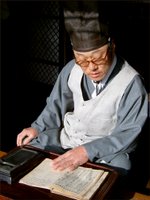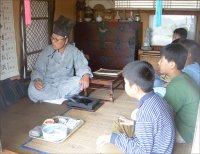
Village teacher (hunjang) reads diligently even at the peak of the farming season. ⓒ2004 김대호 (Ohmynews) |
A hunjangnim resides in a mountain village, teaches Chinese characters, etiquette and calligraphy to the kids, tills the land and enjoys popularity among the grannies (Ohmynews). Mr Yi, the hunjang, composed a poem called Sanjungmundap (山中問答, Questions and answers in the mountain) for the writer of the article, who himself is an artist: 問余何事栖碧山(문여하사서벽산)
출처 : 왜 산에서 사냐면? 웃지요 - 오마이뉴스
Miksi asun siintävillä vuorilla?
笑而不答心自閑(소이불답심자한) Ehkä naurat, mutta mieleni on tyyni.
桃花流水杳然去(도화유수묘연거) Persikankukka kulkee vettä kauas
別有天地非人間(별유천지비인간) Täällä olen maailmalta muualla. Finnish translation from the colloquial Korean translation provided in the article. The difference between one's own and a foreign language is so clear when trying to translate a poem. I just can't get it done in English.

Hunjangnim teaches Chinese characters to the village kids. ⓒ2004 김대호 (Ohmynews) |
Turns out that the village teacher abandoned a thriving business and left for the mountain. He had done his duty as a parent and sent his childern to the world, learned classics and writing from a master and entered the mountain. The life is now so carefree and stressless that he thinks he might as well live up to 120.
(Cannot help thinking that the previous business has provided a good economic base for his present leeway. He is lucky to be able to afford that.)
The above poem in colloquial Korean:
왜 푸른 산에서 사느냐고?
웃어 보일 뿐 내 마음 한적하기만 하네
복숭아꽃 물길 따라 아득히 흘러가는데
여기가 바로 딴 세상 속세를 떠났도다
출처 : 왜 산에서 사냐면? 웃지요 - 오마이뉴스
Categories at del.icio.us/hunjang: Koreanculture ∙ literature/movies ∙ education |





Comments to note "Hunjang in the mountains" (Comments to posts older than 14 days are moderated)
Write a Comment